Readings Newsletter
Become a Readings Member to make your shopping experience even easier.
Sign in or sign up for free!
You’re not far away from qualifying for FREE standard shipping within Australia
You’ve qualified for FREE standard shipping within Australia
The cart is loading…






In this ground-breaking collection of essays, the editors and authors develop the idea of Linguistic Citizenship. This notion highlights the importance of practices whereby vulnerable speakers themselves exercise control over their languages, and draws attention to the ways in which alternative voices can be inserted into processes and structures that otherwise alienate those they were designed to support. The chapters discuss issues of decoloniality and multilingualism in the global South, and together retheorize how to accommodate diversity in complexly multilingual/ multicultural societies. Offering a framework anchored in transformative notions of democratic and reflexive citizenship, it prompts readers to critically rethink how existing contemporary frameworks such as Linguistic Human Rights rest on disempowering forms of multilingualism that channel discourses of diversity into specific predetermined cultural and linguistic identities.
$9.00 standard shipping within Australia
FREE standard shipping within Australia for orders over $100.00
Express & International shipping calculated at checkout
In this ground-breaking collection of essays, the editors and authors develop the idea of Linguistic Citizenship. This notion highlights the importance of practices whereby vulnerable speakers themselves exercise control over their languages, and draws attention to the ways in which alternative voices can be inserted into processes and structures that otherwise alienate those they were designed to support. The chapters discuss issues of decoloniality and multilingualism in the global South, and together retheorize how to accommodate diversity in complexly multilingual/ multicultural societies. Offering a framework anchored in transformative notions of democratic and reflexive citizenship, it prompts readers to critically rethink how existing contemporary frameworks such as Linguistic Human Rights rest on disempowering forms of multilingualism that channel discourses of diversity into specific predetermined cultural and linguistic identities.